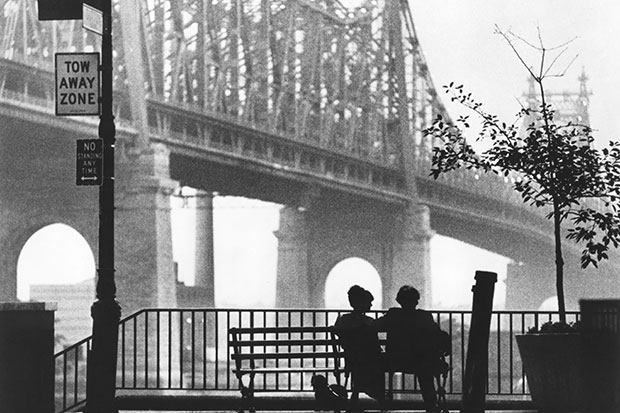Woody Allen (born Allan Stewart Konigsberg), the prolific, Oscar-winning auteur, New Orleans-style jazz clarinettist, doyen of New York delicatessen society, moralistic nihilist and icon of nebbishes everywhere, will be 80 on 1 December. He says he hopes to sleep through the occasion, but he is already completing next year’s film, his 47th, and preparing a series of programmes for television. In the meantime, here, in homage, are two magnificently illustrated catalogues raisonnés.
Both books incidentally tell the story of his life, including the time when he courted his former partner Mia Farrow’s adopted daughter, Soon-Yi Previn, and caused all media hell to break loose. He survived disapproval by working, married the girl in 1997, and they still live happily together.
He was born in the Bronx and brought up in Brooklyn. His father was a taxi-driver, bartender and soi-disant jeweller, and his mother worked in a flower shop. She took her son to the cinema for the first time at the age of three, to see Snow White and the Seven Dwarfs, which combines the essentials of romantic drama — beauty, fear and comic relief. He was immediately so attracted to the screen that he reached forward, as though attempting to touch it. Years later, of course, he succeeded in a big way.
According to Radio Days, a nostalgic portrayal of Allen’s early boyhood, when his whole extended family listened to the radio night and day, his affectionate but irritable father and mother and their rabbi competed for the privilege of smacking his head. He was a highly intelligent, unenthusiastic scholar. Expelled from New York University, he began selling gags to newspaper columnists and comedians on radio and in nightclubs. The writing came easily. He soon found jobs performing his material, and by 17 he was making more money than his parents combined.
‘Jokes saved my life,’ he told Jason Solomons, the distinguished film critic, in an interview at this year’s Cannes film festival, which is reproduced in full in this book. Allen needs all the psychological relief that jokes can provide. He is tormented by a constant neurotic awareness of the inevitable loneliness of death — an acute form of hypochondria, the substratum on which all his other ideas are based, even if only by implicit contrast.
Solomons, in his analysis of Play It Again, Sam, quotes a fictitious young woman’s interpretation of a Jackson Pollock abstraction, coinciding with Allen’s own perennial vision of everything. She says:
It restates the negativeness of the universe. The hideous lonely emptiness of existence. Nothingness. The predicament of man forced to live in a barren, godless eternity like a tiny flame flickering in an immense void with nothing but waste, horror and degradation, forming a useless bleak straitjacket in a black absurd cosmos.
Ever since he changed his first name after Woody Herman, a clarinet player in the swing era, Allen has spent much of his life distracting himself from morbid brooding by means of sex, jazz, laughter and directing and acting in films, especially as they have enabled him to work with good-looking, intelligent women. His career has been sustained by his original imagination, willingness to take creative risks, unflagging industry and the fact that so many leading actors are eager to appear in his films, even at lower than usual pay. His own experience of marital dysfunction enables him to write dialogue of appallingly funny fidelity to men and women in fraying relationships.
Jazz has always meant a lot to him. When his band was playing in Michael’s Pub in Manhattan, I once had the opportunity between sets to tell him his last solo reminded me of Johnny Dodds, a compliment rewarded right away with an invitation to Allen’s private screening room. Solomons approvingly notes Barbara Kolle’s documentary Wild Man Blues, showing Woody Allen’s New Orleans Jazz Band touring Europe, accompanied by Soon-Yi, in 1997, the year of their wedding. His musical performances are exuberant, his thanks to audiences modestly diffident.
He wrote his first screenplay in 1965, for What’s New, Pussycat?, whose storyline was directed by the producer’s whims. The result disappointed Allen grievously. From then on he has insisted on directing his own scripts without any interference from investors and distributors. His early independent productions, such as Take the Money and Run and Bananas, may be regarded as mere comic-book juvenilia, but are spiced with sophisticated allusions. There are Buster Keaton slapstick elements in Sleeper, but, after all, the story was inspired by one of the scientific romances of H.G. Wells.
Solomons and Tom Shone are in harmonious, erudite agreement on the superior technical and imaginative qualities of many of Allen’s best-loved films — Annie Hall, Manhattan, Broadway Danny Rose, Hannah and Her Sisters, Crimes and Misdemeanors, Mighty Aphrodite, Midnight in Paris and Blue Jasmine — and both experts are equally severe in their appraisals of experimental failures apparently influenced by Allen’s admiration of Bergman and German expressionists. Solomons seems particularly appreciative of Allen’s Jewishness, while Shone, after a long, comparably authoritative career as a London film critic, achieved an extra American critical point of view at New York University, where he teaches film history and criticism. The two authors’ best birthday present to Woody Allen is their joint assessment that he is a genius.






Comments